PACHI TAPIZ: Can you tell us about your first contact with music?
ELLERY ESKELIN: My first contact with music came from my mother, Bobbie Lee. She played Hammond B-3 organ professionally with her own groups in Baltimore during the early 1960s. From her I became familiar with the sound of the music and learned many standard tunes. My father, Rodd Keith Eskelin, was also a musician and I am told that he played records like Stan Kenton's City of Glass to me when I was a small child. I don't remember that, but I sometimes wonder if this had some effect on me because I have always been very open to new sounds.
PACHI TAPIZ: What kind of music do you to listen to usually? Could you give us any titles of the most impressive recordings you've listened to lately?
ELLERY ESKELIN: These days I listen almost exclusively to the radio. There are a couple of good radio stations in the New York City area such as WFMU (free-form) and WKCR (jazz, classical, world). I enjoy listening to music that I do not already know. I also enjoy listening to music when I do not know what I am listening to or who the musicians are. My listening is not restricted to any one genre. I listen to every kind of music there is. So it is actually a bit difficult for me to choose one or two recordings to speak about. There is so much to listen to!
PACHI TAPIZ: When did you decide that you wanted to become a professional jazz musician?
ELLERY ESKELIN: When I was ten years old, on the first day I played the tenor saxophone.
PACHI TAPIZ: Can you tell us about your musical education and training?
ELLERY ESKELIN: I studied music in school but my real musical education took place on the bandstand by playing music in front of a listening public. Even if I did not have a gig of my own I would sit-in with any group that would allow me to play. I did not always know what I was doing musically but I used my ear to guide me and figured the technical things out as I progressed. Along the way I had help from other musicians such as George Coleman (who helped me with learning the be-bop conception) and David Liebman (who helped me with some more modern conceptions) as well as some local musicians in various cities who I learned from while travelling.
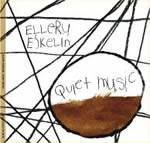
PACHI TAPIZ: Quiet Music is your recording number 10 with Mr. Black and Ms. Parkins. What made you release it as a double CD and offer it directly to your fans instead of releasing it through HatOlogy as you’ve done for years?
ELLERY ESKELIN: Because we did not perform any compositions on our last recording, Ten (which was completely improvised), I had a lot of music that accumulated from that time. We did not record again for two years and I was writing new music to perform on our tours. So when we entered the studio in May 2006, we recorded everything that we had been playing. I did not know at that time that I would release a double CD but after listening to everything it became clear to me that the music held together very well even though there was so much variety.
Also, because many people have become used to listening to music on computers and small listening devices like iPods, I wanted to make this CD very special so that people would pay attention to it. I spent a lot of money to make sure that the recorded sound was the best possible. I wanted to make the a serious presentation of the music as an alternative to the "throw-away" nature of listening to music on computers. Also, by offering a double CD I felt that I could give the listener some additional value for their money. It's really like being at a concert listening to two sets of music.
I chose to present this project on my own recording label, Prime Source, for a number of reasons. First, let me say that I have had good relationships with the labels I have recorded for during the past twenty years, particularly with hatOLOGY. hatOLOGY has been in existence for more than thirty years and has released many classic and legendary recordings of contemporary music. hatOLOGY is responsible for supporting this band for ten years, allowing us to continue touring and recording on a regular basis. I am very proud to work with them.
But it has become more difficult for labels to do business these days, due largely to the fact that retail stores are losing so much business. Our audience has now come to expect that we will sell our CDs at our concerts. Because of the internet, it is easier than ever before for fans to find music and order it through the mail. Because of new technology there are more musicians recording than ever before and that means that perhaps there are too many recordings available to the public. Because of this, artists must be sure that they are offering a music that is fresh and new and present it in a way that stands out and is attractive to the public. It has been going in this direction for many years and so this is really just a natural decision for me. At this point in my career I think it should be possible for me to self-produce my music. I hope our fans will follow us as the business and our music changes.
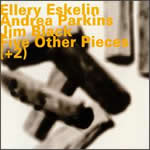
PACHI TAPIZ: Who's the owner of the rights of your HatOlogy Recordings? Could you publish some out-of print titles? I'm thinking about Five Other Pieces (+2)
ELLERY ESKELIN: The rights to the hatOLOGY recordings are owned by hatOLOGY. hatOLOGY has plans to re-release the titles that have gone out of print, but I am not yet sure when this will begin.

PACHI TAPIZ: Are you planning to release some new recordings in Prime Source?
ELLERY ESKELIN: Yes, I think so. This is not the first recording that I have self-produced for Prime Source. There was Premonition - Solo Tenor Saxophone in 1992 and in 2004 I released the DVD tour diary On the Road with Ellery Eskelin w/Andrea Parkins & Jim Black. I may continue to work with some other labels from time to time but as long as I am successful with my self-productions, I will continue in this direction.
PACHI TAPIZ: Are you planning to release some other musician? Or your father's work that is being releasing in Tzadik?
ELLERY ESKELIN: At the moment I am concentrating only on releasing my own music. As for Rodd Keith, I have no current plans to release more of his work myself. But there may be the possibility of further releases on some other labels.
PACHI TAPIZ: Can you tell us about the evolution of the way you composed in the past and the way you create your compositions now?
ELLERY ESKELIN: In the beginning my composing was more about structure. The composition dictated a structure (shape of the music) and the improvisation determined the content. Now my compositions set in motion certain kinds of processes (musical motion) in which the structures are themselves improvised. We improvise like composers, not soloists. It is a true group music. But I am still the leader and composer.
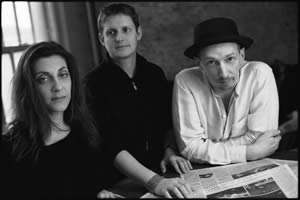
Andrea Parkins, Jim Black y Ellery Eskelin
© Robert Lewis
PACHI TAPIZ: What brings Andrea and/or Jim to your compositions?
ELLERY ESKELIN: They bring their own musical personalities. And it's the same with Jessica Constable. She has a unique sound and approach which she brings to the music. And on Quiet Music we also have Philippe Gelda, another musician with a distinct musical character and sound. This music could not be replicated by any other musicians.
PACHI TAPIZ: When did you discover Jessica Constable? What does she bring to your music? Has your trio now become a quartet? What's the difference of your approach to the music with Jim and Andrea as against you, Jim, Andrea and Jessica?
ELLERY ESKELIN: I first heard Jessica Constable and Philippe Gelda performing a duo concert at the festival Jazz à Luz in southern France in 2000. They have been performing together for more than ten years. I had not heard of them before but I was very impressed with their music. I had never thought to add a vocalist to the group but after I heard this concert I invited Jessica to join us on some concerts in France from time to time. And in 2004 she began joining us on European tours. Jessica is unique because she has developed her own language as a vocalist. Not real words with literal meaning, but an approach that sounds similar to words. She is able to interact with us as an equal member of the group, not like the traditional role of a vocalist. I think of the group as a quartet when she performs with us, although we still perform as a trio from time to time. I think the approach of the band is the same as trio and as quartet, it is just the sound that is different.
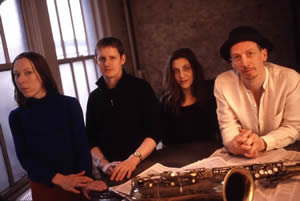
Jessica Constable, Jim Black, Andrea Parkins y Ellery Eskelin
© Robert Lewis
PACHI TAPIZ: Could you introduce Philippe Gelda to our readers? Is he a new member of your basic trio turned out to quartet with Jessica, or is this only some kind of one-off collaboration?
ELLERY ESKELIN: When I began composing for Quiet Music I realized that it would be advantageous to have an additional keyboard player on some pieces, because I was asking Andrea to do more than one person can comfortably do. I also wanted to create an arrangement of the composition "La Berceuse d'Angela" (by Olivier Marcaud) which is a children's lullaby originally sung in French by a male vocalist. Because Philippe is also a great vocalist in addition to being a great pianist he was the perfect solution to this situation. He understands song as well as pure improvisation. Philippe did a wonderful job even though he had never played with us before.
I plan to continue to perform with the group as a trio, quartet and sometimes as quintet as opportunities present themselves.
PACHI TAPIZ: How many time do you spent in rehearsing for your shows?
ELLERY ESKELIN: Usually two or three rehearsals if we are learning new music.
PACHI TAPIZ: In your recordings you usually play some other people’s pieces. What are you looking for that makes you to choose them?
ELLERY ESKELIN: I'm not always sure. I can hear in my mind what the piece might sound like if we played it and I know immediately whether that is something I want to do or not. With our instrumentation and musical personality any piece of music we play will be transformed.
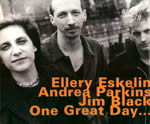
PACHI TAPIZ: There are many differences in the scene you described in the liner notes of One Great Day and the current scene?
ELLERY ESKELIN: One Great Day was released ten years ago. I think the musical scene is still similar in some ways. Musicians are finding ways to make sense out of a fragmented culture.
PACHI TAPIZ: What do you mean by "fragmented culture"?
ELLERY ESKELIN: In the past, traditions were more localized and centered around particular communities. Since the 1960's the pace of life has increased greatly and because of increased travel, mass media and computer technology we are exposed to much more information. This has an effect on cultural traditions a they collide and overlap. Artists and musicians are then faced with the challenge of making sense of their world. As a result I notice that music today is coming together and combining many elements from many different sources.
PACHI TAPIZ: Is this "fragmented culture" positive or negative for musicians?
ELLERY ESKELIN: I suppose that depends on each musician but I think it's a reality. Some musicians will want to preserve the past. I think the idea of conservatism is important since there is a rich tradition to be preserved if possible. But improvised music is inherently personal to the musicians doing the improvising. And so I think it is a positive and natural thing for improvisors to reflect the world they live in. Fragmentation is really only an illusion of perception. It's the older people who remember the past and may see current changes as a threat. Yet the younger people accept the circumstances they are born into as normal and for them there is no real fragmentation.
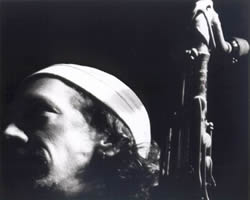
© Carmen Llussà
PACHI TAPIZ: Could it break what we know as “jazz tradition”?
ELLERY ESKELIN: It all depends upon your point of view. If we take a conservative view we could argue that the true tradition ended in the 1960's with John Coltrane. If we take a more open view we could see the effects that jazz continues to have on music of today and realize that the nature of the tradition has changed and the music is still growing. I'm not sure which of these two positions I believe. But it does not really matter since we are only talking about a word, "jazz". Creativity continues and that of course if very positive, no matter what we call the music.
PACHI TAPIZ: You talk about preserving the tradition. What's more important in jazz: innovation or tradition?
ELLERY ESKELIN: Tradition is necessary but innovation is what keeps the music alive.
PACHI TAPIZ: Is “jazz” a proper label for the music you're composing and playing?
ELLERY ESKELIN: I don't know anymore. Jazz can mean different things to different people. I feel a strong connection to jazz in my saxophone playing but the music I play may be a different kind of music.
PACHI TAPIZ: What does “jazz” mean to you?
ELLERY ESKELIN: I really don't know and I don't feel the need to have a definition. The word “jazz” is too general to mean one thing. It's more interesting to talk about how a specific musician or piece of music relates to something else.
PACHI TAPIZ: What means “48A&B”? It looks like some kind of Braxtonian title.
ELLERY ESKELIN: 48 because it's number 48 in the book. A&B because it's two parts played against each other at the same time. Jessica and Andrea play the A material and Jim and myself play the B material.
PACHI TAPIZ: Why have you not included any liner notes in your new CD?
ELLERY ESKELIN: I wanted to make more of a visual presentation with this project. Also, I've said many things in my past liner notes and I'm not sure how much more I have to say in words.
PACHI TAPIZ: How many copies have you published of your new double CD?
ELLERY ESKELIN: I pressed 2,000 copies to begin with.
PACHI TAPIZ: How many projects are you maintaining at this time?
ELLERY ESKELIN: At the present time I am playing in a number of other bands: Vincent Courtois; Sylvie Courvoisier; Ellery Eskelin, David Liebman; Ellery Eskelin Quartet, as well as projects led by Lisle Ellis, Gerry Hemingway and occasional projects with various other musicians.
PACHI TAPIZ: Is it very difficult for you to be a musician and also a father and husband?
ELLERY ESKELIN: I try to maintain a good balance between travel and home time. I must say that it is a wonderful thing to be a father and and wonderful thing to be able to have a life in music.
More information about Ellery Eskelin:

